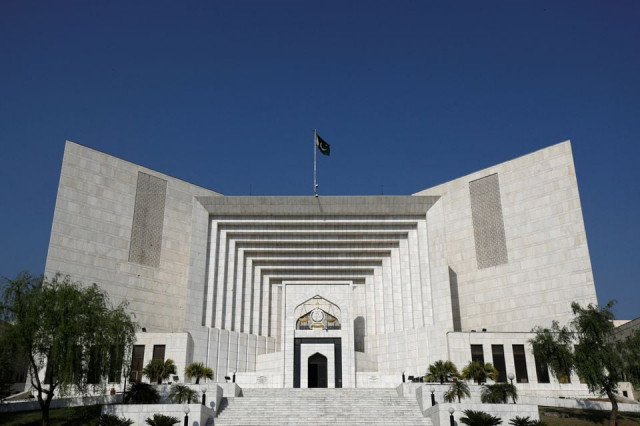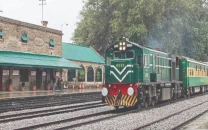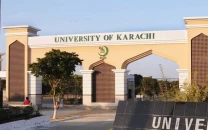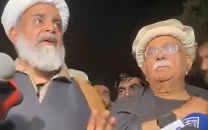Military trial of civilians gets SC’s nod
5-1 majority verdict nullifies earlier decision; rules outcome to be contingent upon final judgment

The Supreme Court on Wednesday conditionally suspended its prior decision to invalidate military trials for 103 civilians till a final judgment on the matter.
The top court stated that the ongoing military trials of the civilians, accused of involvement in attacks on army installations during the unrest following the arrest of former prime minister Imran Khan on May 9, would proceed. The court declared that the final decision of the trial in the military courts would be subject to the final ruling.
The majority 5-1 verdict, reached by a six-member bench, stems from a series of intra-court appeals (ICAs), contesting the previous unanimous ruling nullifying the military trials, filed by the caretaker federal government and the provincial governments of Balochistan, Punjab and Khyber-Pakhtunkhwa. The Sindh government abstained from filing a plea.
The bench was led by Justice Sardar Tariq Masood and comprised Justice Aminuddin Khan, Justice Muhammad Ali Mazhar, Justice Syed Hasan Azhar Rizvi, Justice Musarrat Hilali and Justice Irfan Saadat Khan.
As the hearing commenced, Justice Sardar Tariq Masood refused to recuse himself from the bench over objections raised by the counsels. Advocate Latif Khosa informed Justice Masood that objections had been raised over his presence on the bench, to which he replied if his client, Aitzaz Ahsan, had been issued a notice on notice on the matter.
The apex court judge then added that arguments could be conducted if there are objections against a judge's inclusion before a notice has been issued and referred to an earlier decision by Justice (retd) Jawad S Khwaja which stated that it is the will of the judge to either remain or recuse himself from the bench.
Attorney General of Pakistan Mansoor Awan said that the objections raised by the parties are baseless, and urged the bench to hear the case on merit.
Khosa, however, countered that Justice Masood had given his opinion on pleas related to military courts in his earlier note. To which Justice Masood asked the counsels who had objected and was informed by Advocate Salman Akram Raja that Justice (retd) Khwaja had raised objections.
Upon the objection to the formation of the bench, Justice Sardar Tariq Masood remarked that the lawyers should familiarise themselves with the ruling of Justice Jawad S. Khawaja.
The decision to stay on the bench or recuse oneself from hearing rests with the judge, he remarked. The counsels were reminded that it was Khwaja's own verdict stating that it was a judge’s discretion to decide whether to recuse himself or not. "I will not recuse myself from the bench, what can you do," said Justice Masood. "You are hearing the case despite our objections," replied Khosa.
The AGP again asked how could objections be heard when there has been no notice on the matter. Referring to Khwaja, he added that those "who raised the objections are themselves not present in court".
Advocate Latif Khosa, representing Aitzaz Ahsan, one of the petitioners against the military trials, raised an objection to the bench's formation. Justice Masood inquired if he had received a notice as a respondent in the case.
The judge commented, "Once the respondents are notified, we will consider your objection."
Faisal Siddiqui, representing the pleas filed by civil society members, contended that the government shouldn't engage a private lawyer for this matter.
In response, AGP Awan stated that all necessary legal procedures for securing the services had been completed. He urged the court to initially address the petitioners who had submitted the ICAs.
The defence ministry's counsel, Khawaja Haris, then took the rostrum and argued that the SC's earlier order dated Oct 23 did not mention which articles of the Constitution and provisions of the Army Act were declared unconstitutional.
Citing the case of Brigadier (retd) F.B Ali, he said the Army Act's sections were upheld and a 17-member full court had also declared the judgement as correct when hearing a case on the 21st Amendment.
Haris added that the apex court had previously ruled that if a crime pertained to the military, then the trial could be held in a military court.
Justice Mazhar inquired from Haris how he would ensure that a "fair trial" was held in military courts. In response, he referred to the trial of Indian spy Kulbushan Yadav and argued that the Army Act's jurisdiction over civilians was "already limited" and provisions related to civilians could not be declared void.
Justice Masood then observed that noted that a detailed verdict on military trials of civilians had not been issued.
He questioned the framework under which "terrorists would face trial after section (2)(1)d was invalidated." At this, Raja said he was ready to present compelling arguments if the court granted him the opportunity to do so.
“Under what law would those be tried who martyred 23 jawans yesterday?” asked Justice Masood, referring to militants storming a compound used by the military in Dera Ismail Khan’s Daraban area on Tuesday.
Raja emphasised his intention to tackle the inquiries while presenting his case, noting that section (2)(1)d was implemented in 1967, followed by the enactment of the 1973 Constitution, which aimed to safeguard fundamental rights.
When Justice Saadat asked Harif why not wait for the detailed verdict in the case, he responded that he would then request the SC to allow the resumption of military trials of those already in military custody.
Khosa, objecting to a stay order on the Oct 23 verdict, said that the judges who made that decision were also part of the apex court.
AGP Awan requested the court to allow conditional resumption of a military trial, to which Justice Masood asked how could the court allow the action when certain sections of the Army Act had been nullified. Justice Mazhar then wondered why was there such a hurry to decide on the matter.
Justice Hilali asked, “If the arrested people are terrorists, then why are you acquitting them?” To this, the AGP said, “These people are our citizens but have just gone astray.” The court had then reserved its verdict, which was then announced after a short recess.
It is pertinent to note that on Monday, Justice Ijazul Ahsan, who is a member of the three-judge committee constituted to fix cases before different benches, had objected to the bench, saying it should be “deemed as not set up by the committee”.
Justice Ahsan recalled how during the fifth meeting of the committee, it was agreed that since the judgment in the trial of civilians by military courts had been rendered by a five-judge bench, a seven-judge bench should be constituted to hear the ICAs. Instead, a six-judge bench was formed, with Justice Sardar Tariq Masood as its head.
“I categorically and in clear terms stated that in order to dispel any impression of pick and choose, all judges of this court in the order of seniority be included in the appellate bench,” he had stated in a letter to the committee’s secretary.
Separately, former chief justice of Pakistan (CJP) Jawwad S. Khawaja, who is one of the petitioners to challenge the military trials, has also objected to Justice Masood’s inclusion in the bench.
He stated that Justice Masood, along with CJP Qazi Faez Isa, had recused from being a part of the nine-member bench hearing pleas against the military trials.
On Wednesday, during the hearing, AGP Mansoor Usman Awan urged the court to conditionally allow the military trials of civilian suspects to be resumed. Announcing its verdict, the SC said that the trials of 103 civilians would continue.
Observing that the military courts would not issue a final verdict against the suspects, the SC said that the final ruling would be conditional upon the Supreme Court’s orders.
Subsequently, the court issued notices to the respondents and adjourned the hearing until the third week of January.



















COMMENTS
Comments are moderated and generally will be posted if they are on-topic and not abusive.
For more information, please see our Comments FAQ